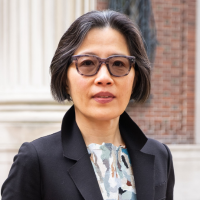China Urbanizing in Global Context: Impacts and Transitions
-
Weiping Wu, Urban Planning, Columbia University
Coach House, Green College, UBC and livestreamed
Wednesday, February 28, 5-6:30pm with reception to followin the series
China Logics -
China’s urbanization has evolved amid the interconnected forces of historical legacies, contemporary state interventions and human and ecological conditions. Embracing this notion, a new collection of work in the book China Urbanizing questions the conventional imagination centring cities in the West. This lecture highlights key conclusions and theoretical touchstones that have emerged. In addition to outlining new perspectives on the impacts of China’s urbanization, Professor Wu will point to the transitions underway as well as the gravity of the progress, particularly in the context of demographic shifts and climate change.
This event has been co-organized with the UBC Centre for Chinese Research.
 Weiping Wu is the Vice Provost for Academic Programs, and Professor and Director of Urban Planning Program at Columbia University. A seasoned urban and planning scholar with a focus on the Global South and China, she is the author and editor of nine books as well as many articles on issues of housing, infrastructure, and migration in China’s cities. In addition to China Urbanizing: Impacts and Transitions, published by the University of Pennsylvania Press (2022), other recent books include The Chinese City (2020, second edition) and The Sage Handbook on Contemporary China (2018). Holding leadership roles professionally, she is the current chair of the Planning Accreditation Board, which accredits university undergraduate and master’s programs in urban and regional planning in North America; chairs the Social and Behavioral Sciences sub-panel of the Hong Kong Research Grant Council; and serves on the international advisory panel for the Lee Kuan Yew Centre for Innovative Cities.
Weiping Wu is the Vice Provost for Academic Programs, and Professor and Director of Urban Planning Program at Columbia University. A seasoned urban and planning scholar with a focus on the Global South and China, she is the author and editor of nine books as well as many articles on issues of housing, infrastructure, and migration in China’s cities. In addition to China Urbanizing: Impacts and Transitions, published by the University of Pennsylvania Press (2022), other recent books include The Chinese City (2020, second edition) and The Sage Handbook on Contemporary China (2018). Holding leadership roles professionally, she is the current chair of the Planning Accreditation Board, which accredits university undergraduate and master’s programs in urban and regional planning in North America; chairs the Social and Behavioral Sciences sub-panel of the Hong Kong Research Grant Council; and serves on the international advisory panel for the Lee Kuan Yew Centre for Innovative Cities.
This interdisciplinary series examines the future of global sustainability, economy and security through the many images and understandings of China, a compelling and sometimes puzzling place. If understanding China constitutes a rational, emotional or symbolic anchor from which one’s ideas, actions and strategies are derived, then there is a need to capitalize on the rich amount of evidence that allows us to examine “China Logics” across time, space and interactions.
Series Conveners: Timothy Cheek, History; Qiang Fu, Sociology; Julia Harten, Community and Regional Planning; Juliet Lu, Forest Resources Management | Public Policy and Global Affairs; Renren Yang, Asian Studies

-
Unless otherwise noted, all of our lectures are free to attend and do not require registration.
Custom Lecture Fields
|